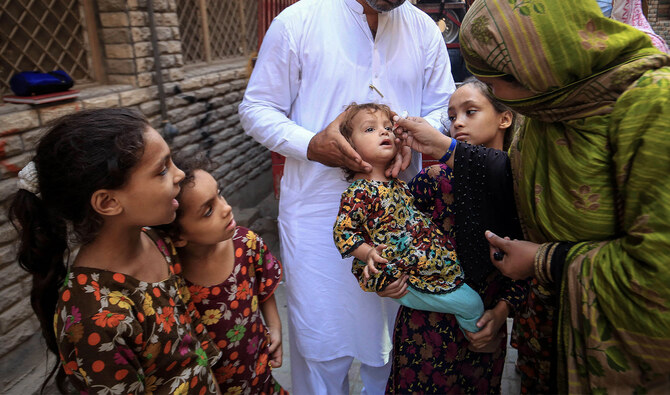ISLAMABAD: Pakistan’s polio program said on Wednesday two new cases of the poliovirus had been detected in the Zhob district of Balochistan and Tank district of Khyber Pakhtunkhwa (KP), taking the number of total cases in 2024 to 28.
Pakistan, along with neighboring Afghanistan, remains the last polio-endemic country in the world. Starting from late 2018, Pakistan saw a resurgence of cases and increased spread of polio, highlighting the fragility of gains achieved in the preceding three years.
“Two more children have been paralyzed by wild poliovirus type 1 (WPV1) in Pakistan, underscoring the expanding public health threat of polio and the urgency for all parents and caregivers to ensure vaccination for their children,” the national polio program said in a statement.
According to the Regional Reference Laboratory at the National Institute of Health, a female child from Zhob district and a male child from Tank district had been affected. This is the second case from Zhob, where a child was affected by polio earlier in July, and the first case from Tank.
“The virus has been found in sewage samples from both districts previously, indicating continued polio transmission and risk to children’s health,” the statement added.
The Prime Minister’s Focal Person for Polio Eradication, Ayesha Raza Farooq, appealed to parents, caregivers and families across Pakistan to get their children vaccinated immediately to protect them from the paralyzing effects of a poliovirus infection.
“The government brings the polio vaccine directly to your doorsteps multiple times a year,” she said.
“Every knock on your door by the polio workers brings hope for a healthier future for your children. Please cooperate with them and bring your children forward for vaccination.”
Farooq said the next nationwide polio campaign would begin from Oct. 28.
Coordinator of the National Emergency Operations Center for Polio Eradication, Muhammad Anwarul Haq, said consistent polio campaign implementation in Balochistan and southern KP had been challenging for the program since last year due to factors such as lack of access to vulnerable children, security issues, vaccine hesitancy and community boycotts.
“Access challenges leave a cohort of unvaccinated children who have low immunity to fight off a polio infection,” he said.
“The Polio Program is working closely with both provincial governments to increase vaccination coverage rates, build trust in communities and provide integrated health service delivery for better health outcomes.”
Pakistan’s polio eradication program began in 1994 and the number of cases has declined dramatically since then but the country continues to face challenges in its fight against polio, including militancy, with polio workers targeted by attacks, particularly in the KP province.
The polio program has adapted to respond to climate disasters such as floods but continues to face disruptions. There are also gaps in supplementary immunization activities, especially in areas where the virus is still present.


















